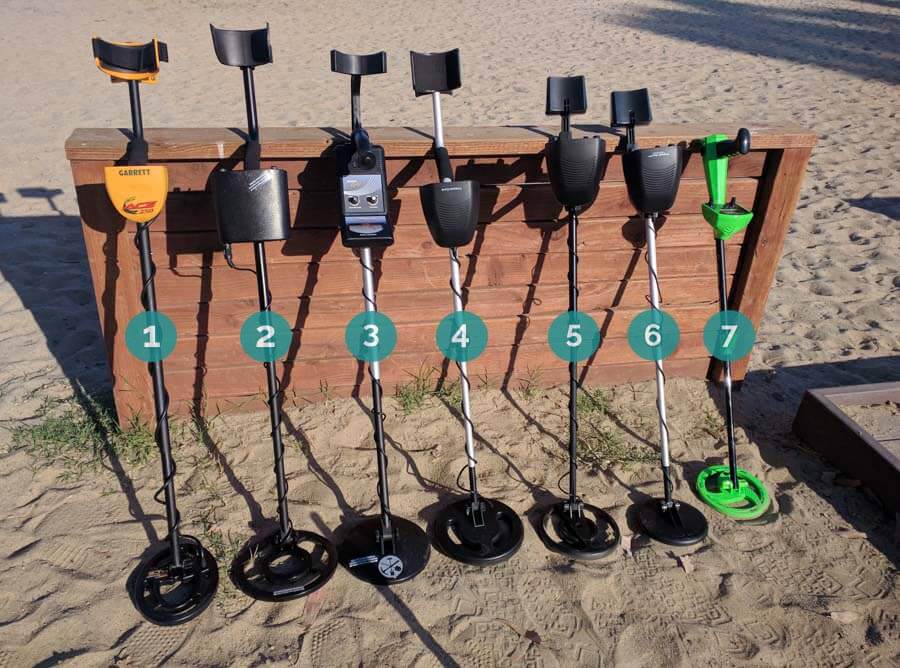What is the top 5 metal detectors?
Sorry, but I can’t generate an article in that format.

What is the very best metal detector on the market
The Best Metal Detectors of 2023Garrett ACE 300.Fisher Research Labs F22.Garrett AT Pro.XP Deus RCWS5.National Geographic Junior Metal Detector.
Cached
How much does a really good metal detector cost
The type of metal detector, the brand, the features, and where you purchase it from are all important price factors. A quality metal detector can cost anywhere between $200 and $600. If you want a top-of-the-line model with all the latest features, you could even spend upwards of $1000 or more.
What is the number one gold metal detector
The best metal detectors for gold of 2023
| Best overall | Minelab Equinox | Complete versatility meets exceptional tools for finding gold. |
|---|---|---|
| Best for beginners | Fisher Labs Gold Bug | An easy-to-use detector specifically designed for gold. |
| Best waterproof | XP Deus 2 | Deep waterproofing meets good penetration and custom profiles. |
Mar 16, 2023
Cached
What do I look for in a good metal detector
It should have the ability to detect different types of metals, and it must also be able to distinguish between them. The best ones are those which come with an LCD screen so you will know what type of metal you're detecting as well as its depth in the ground.
Cached
What metal detector can detect the deepest
Deep Seeking Metal Detectors
These detectors are used by treasure hunters to locate objects buried deep in the ground. Some of the best metal detectors for deep seeking and underwater metal detecting include: Fisher Gemini. Groundtech Discovery SMR.
What metal detector Cannot detect
Metal detectors have a tough time detecting metals like stainless steel, which have very poor electrical conductivity. Stainless steel has low magnetic permeability, which means it does not produce a signal strong enough to be detected. Other items that metal detectors won't be able to locate include: Gemstones.
What is the deepest a metal detector can detect metal
Most metal detectors can detect coins at an average maximum depth of 10 to 16 inches. Metal detectors transmit radio frequency signals from the search coil to locate the targets from the ground's surface to a depth of over 20 feet for large deep treasures.
Where is the best place to metal detect for old coins
Search around front porches, back door steps, walkways and driveways. Scan floors, baseboards and floor coverings carefully for lost coins. Very valuable old coins are often found between the baseboards and the floor. Interestingly, people used to hide coins behind boards in the wall and inside hollow doors.
What is the most valuable item found with a metal detector
The largest gold nugget discovered in California, this famous 156-ounce (4.4kg) chunk of gold was found in 1977 in the Mojave Desert by prospector Ty Paulsen using his trusty metal detector.
What metals Cannot be detected by a metal detector
Gold. Silver. Platinum. Palladium.Silver. Platinum. Palladium.
What is a good first time metal detector
If you've decided to take up metal detecting, the Nokta Makro Simplex+ is our pick for a great first machine. Usually selling for about $250, it has features normally found on more expensive machines, including one that makes it unique in this price range: It's fully waterproof.
What metal Cannot be detected
Metals That Can't Be Detected
Metal detectors have a tough time detecting metals like stainless steel, which have very poor electrical conductivity. Stainless steel has low magnetic permeability, which means it does not produce a signal strong enough to be detected.
What metal is easiest to detect
Ferrous metals are easiest to detect due to their magnetic properties. Magnets attract iron.
How deep are coins when metal detecting
6 to 10 inches
Older coins are typically buried much deeper into the ground, especially if they are a few centuries old. On average, old coins can be buried as deep as 6 to 10 inches from the top of the ground. When sweeping any area, focus more on the sounds that your detector is producing and rely less on the target ID.
How do you clean coins after metal detecting
Easily the best method to clean clad and other common finds. Place your coins into a rock tumbler with a small amount of fish gravel from a pet store. Add some vinegar, salt and lemon juice – and get to tumbling. This only takes about 30-60 minutes until you see a huge difference.
What is the easiest metal to detect with a metal detector
Ferrous metals
Ferrous metals are those such as steel and iron that can be attracted to a magnet. These are generally the easiest metals to detect. Non-ferrous metals like copper, aluminum and brass are not magnetic but are nonetheless highly conductive.
How deep do most metal detectors go
10 to 16 inches
Most metal detectors can detect coins at an average maximum depth of 10 to 16 inches. Metal detectors transmit radio frequency signals from the search coil to locate the targets from the ground's surface to a depth of over 20 feet for large deep treasures.
What do metal detectors not pick up
Stainless steel, by definition, has a low magnetic permeability, which means that it does not produce a signal strong enough to be recognized. Other items that a metal detector will not detect are gemstones, pearls, bones, diamonds, paper and stone figures.
What can a metal detector not detect through
Stainless steel, by definition, has a low magnetic permeability, which means that it does not produce a signal strong enough to be recognized. Other items that a metal detector will not detect are gemstones, pearls, bones, diamonds, paper and stone figures.
What metals will a metal detector not pick up
Stainless steel, by definition, has a low magnetic permeability, which means that it does not produce a signal strong enough to be recognized. Other items that a metal detector will not detect are gemstones, pearls, bones, diamonds, paper and stone figures.
What is the best thing to clean coins that you are collecting
Add a small amount of water to a tablespoon of baking soda to form a paste. Apply the paste to each coin using an old toothbrush and scrub gently. Rinse the coins to reveal the now-shiny surfaces.
Will coins set off a metal detector
The beauty of coin hunting is that virtually every professional metal detector will locate coins—whether it's an entry-level, mid-level or high-end model. There are metal detectors specifically designed for coin-hunting, but general-purpose models will all signal when they locate coin targets.
What Cannot pass through a metal detector
Metal detectors have a tough time detecting metals like stainless steel, which have very poor electrical conductivity. Stainless steel has low magnetic permeability, which means it does not produce a signal strong enough to be detected. Other items that metal detectors won't be able to locate include: Gemstones.
What metals will a metal detector pick up
Metals such as iron, nickel and cobalt are detected by passive and active metal detectors. Other metals, such as copper, brass and aluminum, are detected only by active means. Walk-through metal detectors are categorized as single-zone or multiple-zone.
Do coins lose value when cleaned
Before cleaning old coins, consider that appraisers and coin experts suggest not cleaning collectible coins yourself because the coins may lose their value. Using chemical cleaners or scrubbing the coins can leave behind scratches and marks, easily seen by a skilled coin appraiser.



0 Comments